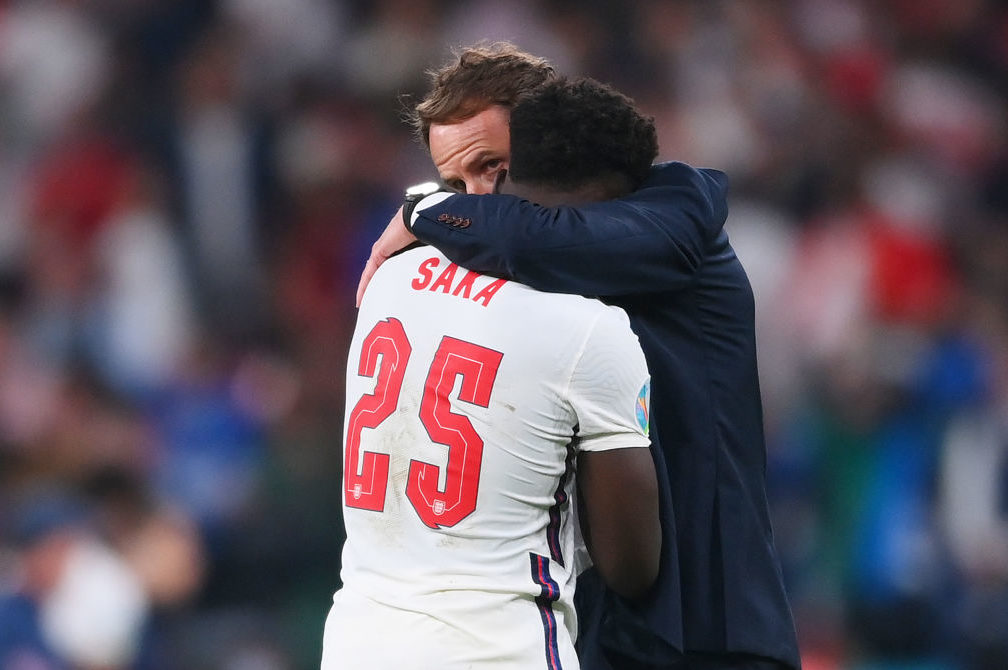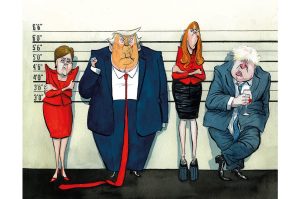London
All is fair in love and war, and nothing is fair in sport. England rode their luck to their first final in a European Championship in London on Sunday night. They scored a stylish goal in the second minute, too — but then their luck ran out. Italy, always the favorites, regained control of the game. They equalized with only 23 minutes of normal time to run, forced a penalty shootout, and won.
You make your own luck. England had the host nation’s home advantage. They had an off-pitch assist from their fans, too. For weeks the words ‘Football’s coming home’ have echoed around this green and pleasant, small and crowded land. England’s game rose as the tournament progressed, until an entire nation waited on tenterhooks for Sunday night.
For what? Football is more than a religion to the English. People drop in and out of religion, and faith comes and goes. But football is a constant, furious passion at the heart of English life — the only activity apart from tea-drinking that unites everyone, regardless of class, race or ethnicity.
Soccer stories are our national myths, and sport the metaphor for minor stuff like history and politics. The English wrote the rules of the game in the years of Victorian empire, and they ruled the game for decades in splendid isolation. Association football was a game for gentlemen — they play it at Eton — and amateurs like the miners and factory workers whose Sunday teams were the seeds from which today’s giant clubs grew.
When the World Cup was invented in the Thirties, the English didn’t bother to send their national team. Why bother when you already rule the world?
Soccer wasn’t all that the Europeans started taking seriously in the 1930s. The ruling-class arrogance that had sneered at the World Cup, or taking tactics and training seriously, led to Munich and the loss of an empire. After 1945, England’s imperial decline and fall was matched by a sinking feeling in the soccer rankings — a fall confirmed after 1950, when England finally entered the World Cup and discovered the world had moved on. Losing India in 1947 was bad enough. Losing 1-0 to the United States in 1950 was worse than 1776.
The exception to this saga of decline came in the Sixties. While the Beatles remade England’s image as a producer of pop fashions, the England team, again with the home advantage, won the 1966 World Cup by beating West Germany. In case anyone missed the political symbolism, a Russian linesman saved England by granting a controversial goal. Victory affirmed the struggles of the past, and hope for the future.
If, like me, you were born after 1966, the images of that golden day haunt the imagination: a promise of a future past, a future that, for all the passion on the pitch and the fury in the stands, we were somehow unable to fulfill. ‘Two world wars and one World Cup,’ the English fans chanted in the long decades of failure that followed. Nostalgia wasn’t enough. In the grim Seventies, England failed to qualify for the World Cup. English teams became notorious for their hooligans, the militias of tattooed thugs who rampaged across the cities of Europe in a nasty parody of the expeditionary forces of empire.
In the Eighties, Mrs. Thatcher sent the Navy to the Falklands and stimulated a tide of prosperity from the City of London. But ruling the waves and the stock exchanges didn’t quite translate into sporting success. England’s team revived, but not quite enough. In 1990, England lost a World Cup semi-final to West Germany on penalties. In 1996, England, again the host nation, lost a European Championship semi-final to a now-united Germany, again on penalties. The mood in England before and during these games was one of open belligerence: revenge for the cost of the world wars, revenge for losing the peace. Tattooed men wept when England lost.
Perhaps this was the problem. It is, after all, only a game. And the game needed to escape the shadow of Old England and catch up with the reality of modern England. After the humiliations of 1996, a new coaching system was created, to foster young talent. Meanwhile, English players played alongside the cream of Europe’s talent every Saturday in the Premier League. With the passage of time, English players became more skillful, and less likely to be overwhelmed by the emotional burden of the past.
Though soccer remains the ‘working man’s ballet’, English football became racially diverse. In the Seventies, football was so racist that neofascists like the National Front targeted football fans for recruitment. Now, the children and grandchildren of Caribbean immigrants are national heroes. When Bukayo Sako, the academically successful son of Nigerian immigrants, missed the penalty that sent England out on Sunday night, there was a wave of support and sympathy. He was one of us: he must be, for he has tasted the gall of English defeat.
Football might not have come home in the form of victory laps and silverware, but the English game has come back to the English in modern, living form. The entire country united behind a young, racially-mixed team, and the boys rose to the occasion and broke the bogey that has kept us from every final since 1966.
‘There is,’ Shakespeare wrote, ‘a tide in the affairs of men which, taken at the flood, leads on to fortune.’ Boris Johnson rode his luck through the Brexit referendum of 2016, and all the way to 10, Downing Street in 2019. The nation rode it again when the government turned a bungled early response to COVID-19 into the triumph of an early vaccine rollout. If soccer is the reality, and politics the shadow play we conduct while waiting for Saturday afternoon, then this European Championship suggests that English soccer is again in sync with what the unromantic and unsporting call ‘real life’.
The English, an old nation, are learning to make their 21st-century luck as an independent people, if not quite first among equals, then at least worthy of a spot in the finals. All the lads need to do now is polish their penalties for the World Cup in 2022…


















